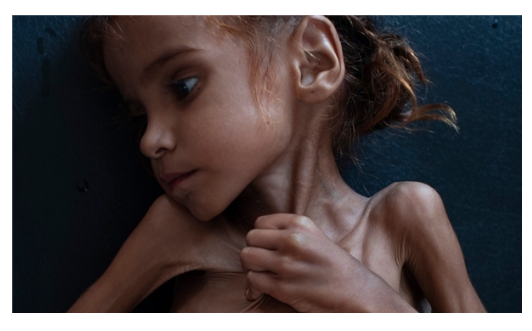
Media Tries to Obscure the Issue , Injustice of Yemen
YemenExtra
SH.A.
A backlash prompted Facebook to stop removing posts featuring a photo of an emaciated seven-year-old Yemeni girl, which accompanied a harrowing New York Times report from the war-torn country.
The atrocities in Yemen don’t make poignant headlines in Western mainstream media as often as stories about chemical weapons in Syria or ‘Russian meddling’, as the conflict usually gets sidelined in the press, but there are notable exceptions, RT reported.
‘The Tragedy of Saudi Arabia’s War’ was the title of a grim report published by the NYT on Friday.
An image of a starved child named Amal Hussain was chosen by the journalists to illustrate the horrible death toll and suffering inflicted on the small Arab nation of Yemen by the armed intervention of its Saudi neighbor.
Readers quickly began sharing the story on Facebook. They were surprised to learn that the company had been removing their posts for supposedly violating the social network’s guidelines.
As the backlash soared, Facebook announced that it would cease to delete posts featuring the photo, and promised to restore the ones it had already removed. The IT giant explained that its rules prohibit the display of nude images of children, but admitted that the picture from the NYT story is “an important image of global significance”.
The NYT stated in response that they will continue to publish unsettling images while reporting on the war in Yemen.
“They are brutal. But they are also brutally honest. They reveal the horror that is Yemen today,” its journalists wrote.
Meanwhile, the NYT case is not the first time Facebook was blasted for censoring ‘important images’, citing its own guidelines. In 2016, the company banned the world-famous 1972 photo showing a nude nine-year-old girl running away from a napalm attack in Vietnam. Following immense criticism, the social network recognized its mistake and ceased deleting the iconic image.
Since 2015, thousands of civilians, mostly children and women have been killed by Saudi airstrikes. Reports say that the Saudi-led coalition is committing daily crimes in Yemen. The Saudi war has resulted in bringing famine to more than 14 million Yemeni civilian, which is half the population. According to Oxfam, a civilian is being killed because of the conflict every three hours. Moreover, the UN says that a child dies every 10 minutes due to starvation
Over 18,000 missile attacks on markets, hospitals and cultural centers by Riyadh and coalition partners UAE, Bahrain, Kuwait, Qatar, Egypt, Jordan, Morocco, Senegal and Sudan, the borders between the two belligerents remain largely unchanged.
